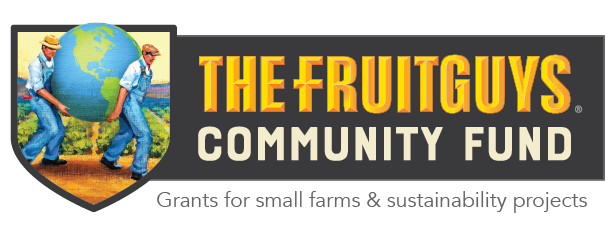Grantee farms progress on solar, soil, and pleasing pollinators.
Reduced carbon footprints and record numbers of pollinators are just a couple highlights of the early results farms are reporting as a result of the agriculture sustainability grants they received earlier this year from The FruitGuys Community Fund.
The eight grantee farms chosen were awarded grants for a total of $35,643 and span from California to Maryland, urban to rural, and for-profit to nonprofit. Each was chosen by The FruitGuys Community Fund, a nonprofit fiscally sponsored project of Community Initiatives, based on how well their proposed sustainability project fit into the 2015 areas of focus: pollination, soil health, water conservation, and energy efficiency, as well as increasing low-income consumers’ access to fresh produce.
The 2015 grantees are: Chicago Lights Urban Farm in Chicago, IL; Berean Hill Farm in Sparks Glencoe, MD; Milk and Honey Meadows Farm in Lakewood, NJ; Chocolates and Tomatoes Farm in Poolesville, MD; South Central Farmers’ Cooperative in Buttonwillow, CA; The Pie Patch Farm in Chicago, IL; Happy Acre Farm in Sunol, CA; Colchester Farm Community Supported Agriculture in Georgetown, MD. Their projects range from solar-powered greenhouses and irrigation systems to soil amendments to beehive installations and habitats for pollinators and beneficial insects. Here are some updates from their interim reports, collected in August.
Berean Hill Farm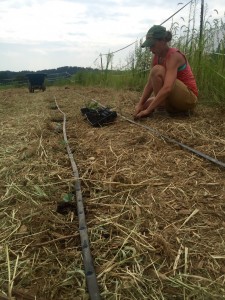
Berean Hill Farm in Sparks Glencoe, MD, which grows sustainable vegetables, flowers, and herbs, received a $3,512 grant to install solar-powered and drip-irrigation systems across the farm.
“We have successfully decreased Berean Hill Farm’s carbon footprint by not relying on fossil-fuel based irrigation methods and successfully implementing a solar-powered irrigation system,” reported co-owner Audrey Swanenberg. “We have completed construction of the solar-powered windmill and completed designing and assembling our gravity-fed, solar-powered drip irrigation system for each of our growing fields. We had the opportunity to host five current beginning farmer trainees on our site and fully explain our irrigation system. We successfully donated produce to DC Central Kitchen, a vocational training and food salvaging organization. They will use the produce for summer meals for students. We also donated produce directly to sober homes in Anne Arundel County, Maryland. Thank you to The FruitGuys Community Fund for supporting us!”
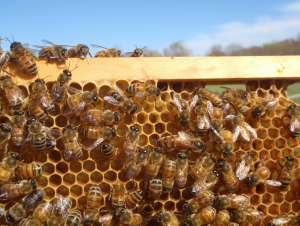 Milk and Honey Meadows Farm
Milk and Honey Meadows Farm
This 18-acre family farm in Lakewood, NJ, raises dairy goats, sheep, and organic vegetables. It received a $4,363 grant to expand its apiary by six hives, establish a pollinator habitat, and build a beehive observatory to facilitate on-farm classes on pollinator importance.
“The hives have been doing well, building up in size and honey and pollen stores to last through winter,” notes Gila Wachman, farmer and owner. “We don’t plan on harvesting honey this year so that our hives have the best chance to get through winter. Serial plantings of annual sources of nectar and pollen such as buckwheat, sunflowers and other flowers were made in the late spring and throughout the summer. These plantings have been swarming with happy pollinators. We have given approximately 20 tours over the summer, serving close to 600 children. We continue to sell direct from the farm at below retail prices and feel fortunate to be able to continue our practice of distributing hundreds of pounds of top quality organic produce for free to local low income families. I would like to express our appreciation once again for giving us this incredible opportunity to both enhance our pollinators and their habitat as well as support our community outreach in educating visitors about the amazing world of honey bees. Thank you!”
Happy Acre Farm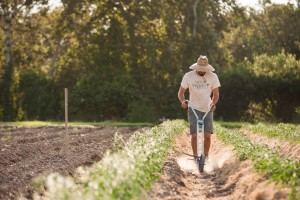
Happy Acre Farm is part of Sunol, CA, Ag Park, a project of the organization SAGE (Sustainable Agriculture Education), that fosters sustainable farming and public education programs while protecting natural resources in the Alameda Creek watershed. They received a $4,868 grant to create habitat for beneficial insects, increase the health of their soil by applying organic cover crops and compost, and implement non-pesticide based weed management techniques with periodic tractor work and a hand tool called a “wheel hoe.”
“The pollinator beds did a fantastic job in attracting beneficial insects and pollinators!” writes Matthew Sylvester, farmer, co-owner. “We have never seen so many native pollinators in our lives. Everyday we see beneficial insects like ladybugs, dragonflies, and wolf spiders as well as pollinators such as bumble bees, native bees, honey bees, hummingbirds, and butterflies. They were all over the pollinator plants. It was fascinating and incredibly successful. We also were surprised to discover so many tree frogs, toads, lizards, and even a 4’ gopher snake, all great signs of a healthy and thriving ecosystem. The soil overall is “softer” because of the amendments and cover crops. The increase in calcium did wonders to prevent the soil from “clumping up or binding” which makes the soil much harder to work with. The Valley Oak Wheel Hoe has been a vital part of our intensive weed management strategy. The different attachments and the high quality of the tool allows us to quickly weed large portions of our acres in a short amount of time. The faster we are able to weed the more we reduce the “weed seed bank” in the soil. The lower the seed bank, the better for our crops to grow and the less they have to compete for sun, water, and nutrients. Another exciting development is that we are now able to accept WIC and EBT benefits from low income consumers’ at our farmers markets.”
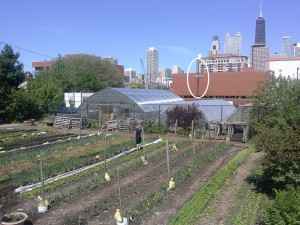 Chicago Lights Urban Farm
Chicago Lights Urban Farm
This urban farm in the middle of Chicago, IL, serves a mixed income neighborhood. It received a $5,000 grant to install solar panels on its greenhouse, which will be used for early seeding, year-round production, education programs, and community outreach events.
“The installation of solar panels to offset electricity costs is progressing on multiple fronts,” writes Joi Brooks, Foundation Relations Officer. “We’ve identified a contractor and figured out the site and placement of the array. We plan to have the city permitting process completed by October and the final installation by the end of November. To date, our market sales have been tremendous, with twice as many customers patronizing the market table and purchasing three times as much produce. Members of our youth job training program have received more in-depth opportunities to learn postharvest produce handling techniques, communication, teamwork, and customer service skills as a result of their work at the off-site farmers market. Many thanks to The FruitGuys Community Fund for the support!”
Chocolates and Tomatoes Farm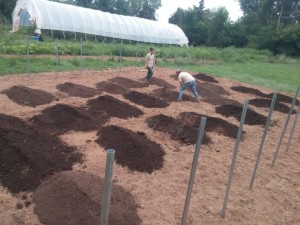
This 4-acre farm in Poolesville, MD received a $4,925 grant to plant two acres of permanent pollinator habitat, establish erosion-reducing terracing on a quarter-acre of ground with steep grade, as well as construct a high tunnel on the terraced area to further reduce water run off. The high tunnel will be exclusively used to grow food for donation to Manna Food Center, a local food bank.
“I am happy to report that the construction of the high tunnel is well underway and our field crops have been so productive this year that we have already surpassed the 5,000 pound mark in our donations to Manna Food Center,” says Mark Mills, farmer and owner. “In the end, the tunnel will allow us to donate throughout the winter and into spring. We have already begun to establish the pollinator habitat with about 1.5 acres in flowers, buckwheat, and other perennials as suggested by our local beekeeping organization. We will complete the last .5 acre once the tunnel is complete as it will surround the site on three sides. The terracing project cannot begin in earnest until the tunnel site is complete, but we have already obtained the rocks necessary for the installation of the French drain around the perimeter. We were able to level the tunnel site prior to construction with less effort than anticipated. Our partnership with Manna is taking a new turn with the construction of the tunnel as we are no longer simply providing food, but also an environment where the younger members they serve can began to understand and appreciate food from its source. Thank you once again for this opportunity.”
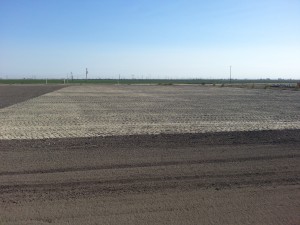 South Central Farmers’ Cooperative
South Central Farmers’ Cooperative
This cooperative farm in Buttonwillow, CA, grows vegetable crops for low-income residents of the Los Angeles area. It received a $5,000 grant to improve soil health on 30 acres of its farm and hold workshops for agricultural workers interested in organic and sustainable farming methods.
“South Central farmers began preparing the ground for amendments by disking the soil,” co-op member Nancy Smith reports. “The soil amendments will enable South Central to plant fall crops to fulfill orders from Conejo Valley Unified School District and Ventura Unified School District. Both school districts have designated South Central Farmers as their farmers-of-the-month. South Central will be providing all the local Ruby Lettuce for the school districts in October. The soil was previously very alkaline and a sulfur/gypsum blend was formulated to bring the soil into neutral range so it will be appropriate for most of the food crops that South Central grows. Thank you for the assistance. The amendments will make a huge difference in yield for the coop!”
The Pie Patch Farm 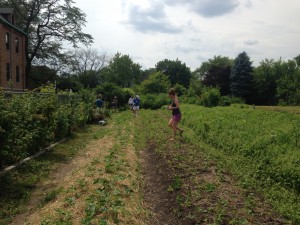
Tiny Pie Patch Farm in Chicago, IL is affiliated with an organization benefitting homeless Latino families. It grows veggies for CSA members and received a $3,033 grant to install a drip-irrigation system, plants for pollinator hedgerows, and seeds for living mulch that will help soil retain moisture.
“The drip irrigation is working fantastic, and I’m happy to report that plants are disease-free,” writes farmer Breanne Health. “A pollinator hedgerow was planted with borage, milkweed, fennel, dill, poppies, alyssum, cosmos, sweet autumn clematis, sage, delphinium, bee’s friend and calamint. While mosquitos were really thick in June, the new arrival of many dragonflies on the farm seems to have taken care of them! It is a joy to watch them arrive at dusk to hunt. I have also had the pleasure of seeing monarchs and swallowtails on the property, as well as numerous crickets, grasshoppers, native bees and spiders. I planted clover, vetch, rye grass, field peas and buckwheat in new flat paths that are now wide enough to be mowed when too tall, so folks can easily walk and pick fruit, yet there should still be benefits for nutrient building in the soil and providing pollinator forage and habitat. I donated half of the season’s harvest to the shelter, which the women living there baked into pies and bars to sell at the local farmer’s market as a way to earn extra income.”
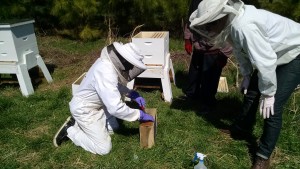 Colchester Farm Community Supported Agriculture
Colchester Farm Community Supported Agriculture
Georgetown, MD’s Colchester Farm features a CSA, but also boasts a robust apprenticeship program and educational programs for local kids. It received a $4,942 grant to expand its apiary, plant native pollinator habitat, and establish a blueberry patch protected with electrified deer fence to prevent significant crop loss.
“We have added four colonies of bees to our farm this year. We used the funds that we received to buy the equipment to build the hives and to buy some of the bees,” reports Theresa Mycek. “The hives have been used as a visual aid to inform and prompt discussion about current concerns over bee populations. The hives have helped us to educate visitors about our continuous efforts toward supporting local bee populations and their importance in an ecosystem, particularly in relation to our growing operation. We have also spent this summer preparing the ground for the blueberry bushes and working up the soil where the pollinator strip will be located. We purchased the deer fence and have set it up around the future blueberry patch. We will soon be purchasing the seed with hopes to sow them in early September. During a recent county-wide farm and winery tour, we had visitors tour the farm and learned about our sustainable practices and plans to diversify and provide more pollinator habitat with the help of this grant.”
The 2015 farm grant recipients will share updates on their projects again in December 2015 and in April 2016.
The FruitGuys Community Fund will issue its call for applications for the 2016 grant cycle in December 2015.
Want to get more involved?
- Volunteer on our Grant Review Committee and help decide which farm projects will get funded in 2016. For more information please email volunteer@fruitguyscommunityfund.org.
- Sign up for The FruitGuys Community Fund newsletter and receive project updates.
- Donate. Just a few thousand dollars can change a farmer’s livelihood and people’s’ lives.
